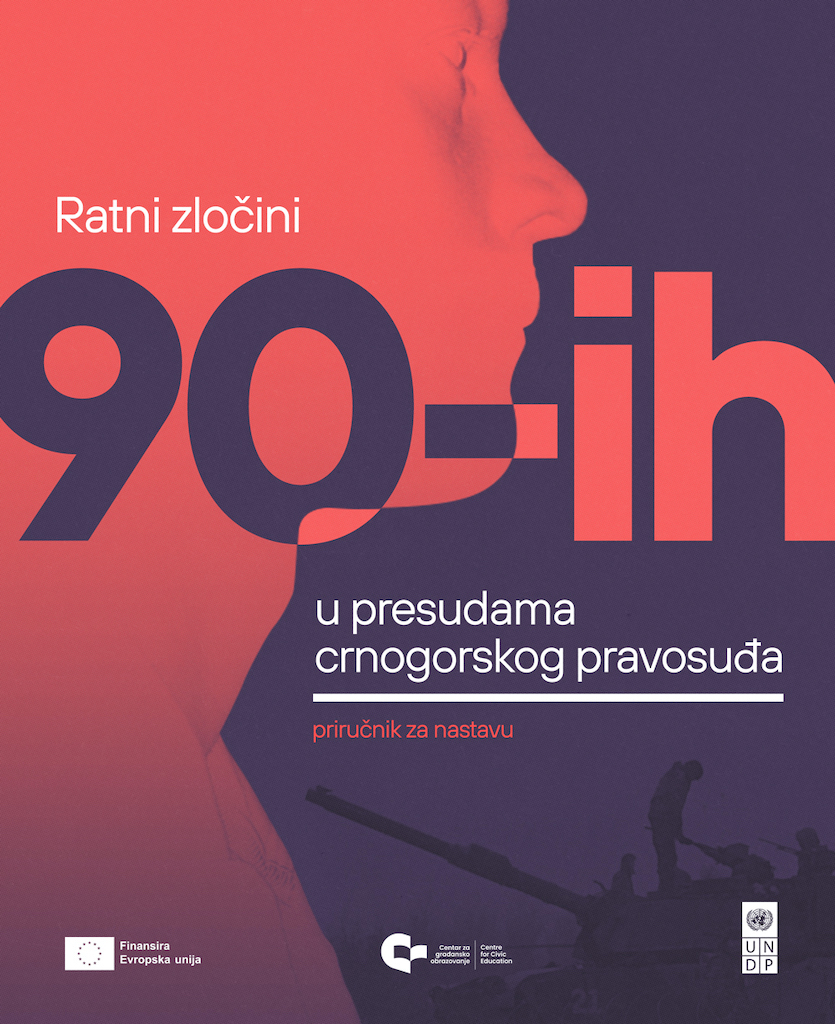Centre for Civic Education (CCE) has published a teaching manual titled “War Crimes of the 1990s in Montenegrin Judicial Verdicts” intended for history teachers in primary and secondary schools in Montenegro, as well as for others educators who find this material useful for teaching. Additionally, it is available to the interested public, providing a comprehensive overview of the events of the 1990s, which is crucial for understanding Montenegro’s recent history and its consequences.
The manual provides an overview of the international legal and historical context of the events in Montenegro during the 1990s. It also addresses the extent to which information about the 1990s wars is represented in the Montenegrin education system. Specifically, it notes that the ninth-grade textbook mentions the attack on Dubrovnik as well as the wars in Bosnia and Herzegovina and Croatia, but it fails to mention any crimes committed by Montenegrin citizens during that period, not even in the context of the Dubrovnik battlefield. On the other hand, the fourth-grade high school textbook covers the breakup of Yugoslavia in greater detail. However, it does not mention a single war crime committed on the territory of Montenegro, while the attack on Dubrovnik was mentioned with the explanation that it was attacked by the Yugoslav People’s Army (JNA), without indicating any connection with Montenegro.
In this unique publication, the authors have systematically and thoroughly addressed all war crimes committed on Montenegrin territory, as well as those in which Montenegrin citizens were victims, that have been adjudicated and finalized by domestic courts. The publication covers seven cases—Morinj Camp, Deportations, Bukovica, the Klapuh family, Štrpci, Kaluđerski Laz, and Zmajević — while a brief overview is also provided on the Murino case and Montenegro’s involvement in the attack on Dubrovnik.
The authors of the manual, historians Miloš Vukanović and Igor Radulović, emphasize that addressing recent history—such as the wars in the former Yugoslavia during the 1990s—is imperative, but it “requires a cautious and measured approach.” They also highlight that “it is the duty of every history teacher to engage with topics often considered controversial, as this contributes to breaking down prejudices and stereotypes among young people, as well as to introducing much-needed democratic principles.”
“If this topic is not sufficiently discussed and if it is, in some way, neglected, it harms young people by ignoring their need to learn more about matters that continue to shape the society in which they live. The supposed need to ‘protect’ the younger generations from topics that are ‘not for them’ only deepens their ignorance about the importance of history and its practical application in resolving certain conflicts,” the authors warn.
The reviewer of the manual, Dr. Adnan Prekić, Assistant Professor at the Faculty of Philosophy at the University of Montenegro, states that the “manual is precisely aimed at tackling the most traumatic period of our contemporary history, and it is the duty of every history teacher to open a discussion on these topics, rather than avoiding them under the misguided excuse that they are controversial”. He also emphasizes that “in historiography, as well as in the education system, there are no more or less controversial topics, only researched and unexplored topics”, and that “rational and methodologically grounded discussion can break down entrenched stereotypes among young people, while their understanding of these parts of Montenegrin history can only benefit them.”
The manual is available in an electronic version on the CCE website, and after the planned training for history teachers, it will also be available in a printed version in Montenegrin and Albanian.
The publication is part of the programme Education for the Future – Transitional Justice for Reconciliation which is supported through the regional project Support of the EU to Trust-Building in the Western Balkans, funded by the European Union (EU) and implemented by the United Nations Development Programme (UNDP).
Damir Suljević, Program Associate

